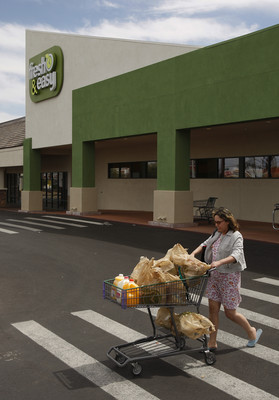Fresh & Easy a tough sell
The company behind Fresh & Easy Neighborhood Market grocery stores insists it will stick to its Las Vegas development plans despite new questions about the viability of the chain's business model.
Grocery industry experts say the small-format markets that opened with a surge of stores in California, Nevada and Arizona are earning as much as 75 percent less money than expected and could fail without a major conceptual overhaul.
The markets, owned by British food giant Tesco, opened in November with stores similar in size to Trader Joe's but with a product mix that includes national brands mixed with Fresh & Easy-branded products.
Now there are questions about whether Tesco completely missed the mark, a problem considering it has already invested an estimated $700 million to open 61 stores and a massive distribution center in Southern California.
"They are in very serious trouble. The concept is not working," said Jim Prevor, a grocery industry consultant with a food blog at www.perishablepundit.org. "The more stores they open, the more money they lose."
In April 2007, Tesco announced it would open 15 stores in Las Vegas. In November, it opened five locations. And in January, the company announced it would take over 10 of 28 Rite Aid stores in Nevada when that chain announced it was pulling out of the market.
Prevor estimates that the stores, which Tesco hoped would generate as much as $200,000 per week in sales, are making closer to $50,000 in sales. Another estimate suggested the stores' sales figures were about $170,000 per week.
Either is a big gap between reality and the company's expectations, and chain executives say they won't open any new stores until July. They promise to use the time until then to "step back and focus on stores that are opened," according to Fresh & Easy spokesman Brendan Wonnacott.
Wonnacott said that the plan to convert the Rite Aid stores is still on track but he didn't elaborate on a schedule.
"They are all at various stages of the process," Wonnacott said.
He also questioned critics' claims that the stores are losing massive amounts of money, although Tesco hasn't released any figures to rebut them.
"That is just speculation on analysts' part," Wonnacott said. "I'm not going to say if they are wrong or they are right."
Changes in the works so far are small. The stores are tweaking their line of prepared foods, a product category it counts on to set itself apart from competitors. The stores will also now accept American Express.
Prevor says the announced changes are not enough to turn things around.
He suggested bigger changes such as breaking into two chains, one that would target upscale consumers like Trader Joe's patrons and another that would focus on low-income clientele.
Fresh & Easy also needs to address issues on its shelves, he said.
The Las Vegas stores lure customers with coupons that take $5 off a purchase of $20 or more. They also package and assign expiration dates to produce items that require neither. When the sell-by date approaches, the stores discount the items or give them away to charity, Prevor said.
It is a strategy Fresh & Easy can ill afford in a low-margin business like groceries, he said.
"They've been training all their customers to expect these enormous discounts," he said.
Grocery consultant Bill Bishop disagreed.
Bishop said Fresh & Easy compares favorably to supermarkets in price and to discounters like Aldi in products.
"It is cheap and it is complete," Bishop said.
He also thinks Fresh & Easy will benefit in the long run by issuing the $5 coupons and marking down produce.
"I don't see them as fatal flaws," said Bishop, who visited Fresh & Easy stores in Phoenix in January. "There probably isn't a grocery store in Las Vegas that hasn't engaged in some loss-leader selling."
In the meantime, Tesco's Fresh & Easy gambit is taking a beating in the British press.
In a report quoted by the Evening Standard newspaper in London, Piper Jaffray analyst Mike Dennis said, "The Fresh & Easy concept is not right and they need to quickly find out what the issues are and reset the concept."
The news report said Tesco executive Tim Mason, who moved to the United States with his family to run Fresh & Easy, recently sold Tesco shares worth $2.57 million.
The paper quoted Dennis saying, "Maybe he knows what the impact of a poor U.S. sales performance could do to Tesco shares in 2008, but any official explanation is probably not going to give clarity."
In the same article, a Tesco spokesman accused Dennis of "scaremongering" and said, "It is ridiculous to make judgments just four months after the first store opened."
Contact reporter Benjamin Spillman at bspillman@reviewjournal.com or (702) 477-3861.

















